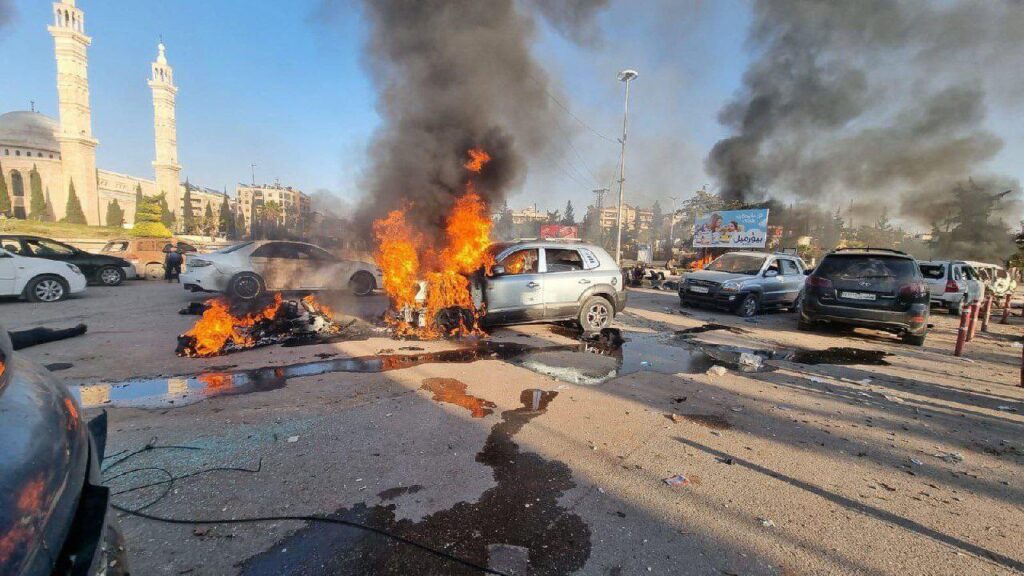The fall of Bashar al-Assad’s regime in Syria could profoundly impact the Middle East, influencing geopolitical alliances, regional stability, and the balance of power among global actors. Here’s an overview of the potential consequences:
The Assad regime had, until a few days ago, survived the conflict, which froze in 2020.
The lightning offensive led by Hayat Tahrir al-Sham (HTS) and supported by a host of other armed groups, which began on 27 November, had toppled Assad’s regime by 8 December. The Syrian Arab Army quickly melted away, underscoring how hollowed out the Syrian state had become following years of warfare, western sanctions, and a widespread sense of hopelessness under Assad’s rule.
HTS and other anti-Assad groups’ ability to take over much of the country so rapidly also spoke to just how dependent Damascus had become on regional allies and Russia – without whose support the Assad regime was unable to stand on its own.
1. Power Vacuum and Regional Instability
- Fragmentation of Syria: The absence of Assad could lead to increased fragmentation within Syria, as various factions, including rebel groups, Kurdish forces, and Islamist militants, vie for control.
- Rise of Extremism: Groups like ISIS or al-Qaeda affiliates might exploit the chaos, potentially destabilizing neighboring countries like Iraq, Lebanon, and Jordan.
2. Impact on Regional Allies
- Iran’s Influence: Assad’s fall would weaken Iran’s foothold in Syria, undermining its ability to maintain supply lines to Hezbollah in Lebanon and diminishing its strategic depth.
- Hezbollah’s Position: Hezbollah’s access to weapons and resources could be compromised, potentially shifting the balance in Lebanon and its conflict with Israel.
3. Shifts in Global Geopolitics
- Russian Influence: Russia, a key ally of Assad, may lose its strategic bases in Syria, such as the Tartus naval facility, reducing its influence in the Mediterranean.
- Western Strategies: The U.S. and European nations might face challenges in managing post-Assad Syria, particularly in preventing extremist groups from gaining ground.
4. Humanitarian and Refugee Crises
- A protracted conflict post-Assad could exacerbate the already dire humanitarian crisis, with millions of displaced people further straining regional and global resources.
5. Opportunities for Negotiation
- Assad’s departure could open avenues for political negotiations, potentially leading to a transitional government and eventual peace, provided international actors effectively manage the transition.
6. Implications for Israel
- Security Concerns: The fall of Assad might increase uncertainty on Israel’s northern border, particularly if hostile forces take control of southern Syria.
- Opportunities: Reduced Iranian influence in Syria could alleviate some security concerns for Israel.
The fall of Assad would undoubtedly mark a major shift in the Middle East, with outcomes depending largely on the ability of local, regional, and global actors to navigate the ensuing complexities. Such a scenario would require coordinated international efforts to stabilize the region and address the underlying issues fueling conflict.
The fall of Assad’s regime in Syria would have varied effects on regional countries, with some potentially benefiting from the power shifts and opportunities for influence. Here’s a breakdown:
1. Turkey
- Potential Benefits:
- Weakening of Kurdish forces like the YPG/PKK, which Ankara considers a national security threat.
- Opportunities to expand influence in northern Syria, including the establishment of a buffer zone.
- Challenges:
- Risk of a power vacuum leading to instability along Turkey’s borders.
- Managing an increased influx of refugees.
2. Israel
- Potential Benefits:
- Reduction in Iranian influence in Syria, as Tehran relies on Assad for access to Hezbollah in Lebanon.
- A weakened Hezbollah due to disrupted supply lines.
- Challenges:
- Risk of extremist groups, including ISIS, gaining control near Israel’s northern border.
3. Iran
- Losses:
- Significant weakening of Iran’s influence in the Levant.
- Loss of a strategic partner in the “axis of resistance” against Israel and Western interests.
- Challenges:
- Increased reliance on other proxies like Hezbollah, which may face logistical challenges.
4. Gulf States (e.g., Saudi Arabia, UAE, Qatar)
- Potential Benefits:
- Reduced Iranian influence in the region.
- An opportunity to support Sunni groups and reshape the political landscape in their favor.
- Challenges:
- Risk of extremist groups gaining a foothold, undermining broader regional stability.
5. Iraq
- Potential Benefits:
- Weaker cross-border Iranian influence if Tehran’s role in Syria diminishes.
- Challenges:
- Spillover of instability, as Syria and Iraq share long borders and have historically shared threats like ISIS.
The ultimate outcomes will depend on how effectively regional and international powers manage the transition period and address the governance and security vacuum created by Assad’s fall.
The end of 54 years of the Assad family’s rule and 61 years of the Syrian Baathist Party’s dominance marks the beginning of a new chapter in Syrian history. The reverberation effects will be felt all over the Middle East in countless ways, most of which will require much more time to fully realise.
Although many Syrians in Syria and throughout the diaspora have been celebrating the collapse of a family dictatorship responsible for decades of cruelty and widespread death at home, as well as next door during Lebanon’s civil war, Arab governments throughout the region are not necessarily overjoyed to see Assad fall.
While many Arab states had a history of problems with the Syrian regime, they have concerns about what the future may hold and the implications for their own interests.
The chances are good that regional actors will proceed with high levels of caution toward post-Assad Syria. Arab governments will most likely allow time to observe HTS’s conduct before making bold decisions about how to engage the country’s new authorities.
They will wait and see how HTS behaves – does it keep its pledges not to target minorities or exact retribution on bureaucrats. Will it support a coalition transitional government.
Arab states will try to set relations off to a positive start with the new authorities in Damascus. In fact, most Gulf Cooperation Council (GCC) states, Egypt, Iraq, and Jordan have already been in communication with HTS’s Political Affairs Department.
As a former close ally of Assad’s government, Iraq has been relaying to the HTS administration that Baghdad will not interfere in Syria’s internal affairs albeit while warning that mistreatment of minority communities in Syria will have reverberations inside of Iraq.
Some countries like Iraq and Algeria will have a specific reaction while some Gulf monarchies concerned by Iran and its Axis of Resistance will breathe a sigh of relief.
Arab states should carefully consider that the area is now defined by three main power brokers: Israel, Turkey, and what remains of the Iranian power, and none of them are Arab. This development should be food for thought for any Arab leader concerned for the Arab Umma.
Bahrain, Egypt, Saudi Arabia, and the United Arab Emirates (UAE) had all invested diplomatic energy into shoring up Assad’s government. Abu Dhabi took the lead on this front beginning with its renormalisation with Damascus in December 2018.
The overall trend in the Arab world was towards the rehabilitation of Assad as a “legitimate” head of state, illustrated by his government’s return to the Arab League in May 2023, his visits to all GCC states, except for Kuwait and Qatar, starting in March 2022, and visits paid by high-ranking Arab officials to Damascus in recent years.
Now all these governments must contend with totally new realities on the ground and adjust their foreign policies vis-à-vis Syria.
A concern for officials in many parts of the Arab world, especially in Abu Dhabi, Cairo, and Riyadh, is that Islamist and jihadist groups throughout the Middle East will feel emboldened by the HTS-led coalition’s rise to power in Syria.
Viewing political Islam as a major threat, the leadership in Abu Dhabi and other Arab capitals have, in various ways, sought to diminish the role of Islamist groups in the region as much as possible. It could be particularly impactful having HTS, an organisation that emerged in the 2010s as an al-Qaeda offshoot, in charge of a country that has historically played a central role, politically, culturally, and ideologically, in the Arab world.
The UAE looks already worried about Syria’s future, stressing the risk coming from non-state armed actors.
It should be a significant confidence boost as the victory of the jihadists in Afghanistan against the Soviets was in the last two decades of the last century.
Governments in the Arab world will not want to see events in Syria play out in manners that harm their interests. Any developments in Syria that could inspire rapid change in other parts of the region will unsettle officials in Arab states who favour gradual reforms rather than dramatic revolutions that suddenly upend political orders.
While the HTS-led government in Damascus may represent ideological and ideational threats to anti-Islamist and counter-revolutionary governments in the Arab world, states such as Egypt, Saudi Arabia, and the UAE will have no choice but to try to make the most of the situation and find ways, if possible, to establish healthy relations with Syria’s post-Assad government.
Arab states will make efforts to contain HTS and build alliances with an HTS-government primarily guided by the hope that what emerges will be friendly to them and their interests.
They will fear that a successful Islamist-led rebellion will inspire jihadis in their own countries and also draw attention to the human rights abuses of other Arab autocracies”.
The GCC and other Arab states are chiefly concerned about Assad’s ouster and the rise of HTS exacerbating instability in the Middle East. With conflicts in this part of the world being contagious, underscored by the 14-month-old Gaza war’s expansion into other parts of the region, Arab leaders and statesmen do not want to see any chaos in Syria spill into Lebanon, Jordan, Iraq, or even the Gulf.
Israel’s actions toward Syria amid and following Assad’s fall have troubled Arab states, which do not welcome Tel Aviv’s decision to exploit the situation. In the first three days since Assad’s ouster, the Israeli military has waged more than 350 airstrikes in most governorates across the country, targeting many military installations.
The Israeli military quickly usurped control of more land in the occupied Golan Heights, claiming that Israel’s security needs required an expansion of the buffer zone. Syrian security forces have accused Israel of waging a military incursion that came within 16 miles of Damascus.
Although an Israeli military spokesperson denied this allegation, maintaining that Israeli forces have not entered any Syrian territory beyond the Golan Heights, Israeli Prime Minister Benjamin Netanyahu recently posted a video on X in which he confirmed that his country’s troops had been waging operations beyond the buffer zone.
Saudi Arabia blasted Israel’s latest actions in the Golan Heights, warning that they will “ruin Syria’s chances of restoring security”. The UAE Foreign Ministry condemned Israel’s land grab and reaffirmed its “commitment to the unity, sovereignty, and territorial integrity of the Syrian state.”
The Qatari Foreign Ministry also declared that the Israeli incursion represents “a dangerous development and a blatant attack on Syria’s sovereignty and unity as well as a flagrant violation of international law”. Similar responses came from Egypt, Iraq, Oman, and other regional states too.
It is reasonable to raise concerns about how extremist groups such as the Islamic State (IS) may stand to benefit from the breakdown of state institutions and resultant power vacuums. With many weapons in Syria, including chemical ones, there are extremely serious security dilemmas that regional states will need to address in this upcoming period of uncertainty and serious risks.
The political transition
It was understandable how five Arab states – Egypt, Iraq, Jordan, Qatar, and Saudi Arabia – along with Iran, Turkey, and Russia issued a statement calling for an orderly political transition in post-Assad Syria in line with UN Security Council Resolution 2254, which the body unanimously adopted in December 2015.
This statement highlights how much the power equation in Syria can change: Qatar, Saudi Arabia, and the UAE want to be part of the new power room in the country.
This means overcoming the prominent role Iran has had so far, but it doesn’t mean however to automatically exclude Tehran from the new Syrian order, since the GCC states want first of all stability in the region, and the continuity of the de-escalation process in the Gulf.
The fall of Assad is a geopolitical earthquake in the Middle East. Given Syria’s entrenched sectarian, ethnic, and regional divisions, Arab states will be keen to prevent a power vacuum from emerging, the rise of extremism, or spillover effects into neighbouring countries.
The probability of ISIS regaining strength in Syria following the fall of Assad’s regime is significant, though it depends on several factors:
- Power Vacuum: The collapse of Assad’s government could lead to a fragmented state, creating ungoverned spaces. ISIS has historically exploited such environments to regroup and expand.
- Weak State Institutions: Without a central authority, Syria’s security and administrative institutions could collapse, providing ISIS the opportunity to assert control in vulnerable regions.
- Regional Instability: Neighboring countries like Iraq, already battling remnants of ISIS, could see an uptick in cross-border terrorism and insurgencies.
- Disenchanted Communities: Marginalized Sunni communities, who might feel excluded from any post-Assad governance structure, could become susceptible to ISIS recruitment.
- Competing Rebel Factions: The chaos following Assad’s fall might see rebel factions, including extremist groups, competing for power, potentially enabling ISIS to regain influence.
Mitigating Factors
- Global Counterterrorism Efforts: International coalitions have degraded ISIS’s capabilities significantly, and continued efforts could prevent its resurgence.
- Regional Cooperation: Neighboring states and actors like the Kurdish forces have a vested interest in preventing ISIS’s revival.
- Local Resistance: Many communities in Syria have suffered under ISIS rule and might resist their return.
While ISIS’s return is not guaranteed, the likelihood increases if regional and global powers fail to establish a stable and inclusive post-Assad order. Addressing the underlying causes of extremism and ensuring effective governance would be crucial to preventing a resurgence.

More on this story: HTS Offensive and Its Global Implications

More on this story: The Decline of Assad’s Grip and Russia’s Waning Influence in Syria”




